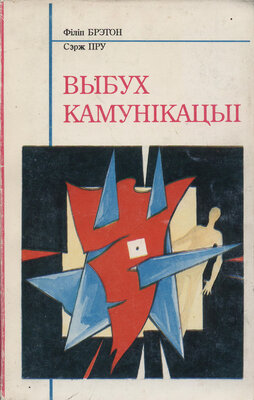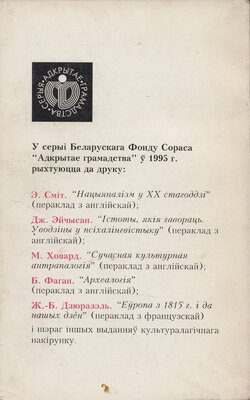Выбух камунікацыі
Нараджэнне новай ідэалогіі
Філіп Брэтон, Сэрж Пру
Памер: 336с.
Мінск 1995
RAVAULT, Rene-Jean, “Defense de 1’identite culturelle par les reseaux traditionnels de ‘coerseduction’ “, International Political Science Review, vol. 7, № 3, juillet 1986, p. 251-280.
RAVAULT, Rene-Jean, “Information Flow: Which Way is the Wrong Way?”, Journal of Communication, vol. 31, № 4, automne 1981, p. 129-134.
REAL. M. R., Mass-Mediated Culture, Prentice-Hall, Englewood Cliffs, 1977.
REBOUL, Olivier, Introduction a la rhetorique, PUF, Paris, 1991.
REBOUL, Olivier, La Rhetorique, PUF, “Que sais-je ?”, Paris, 1984.
REVEL, J.-F., Contre Censures, J.-J. Pauvert, Paris, 1966.
RICHARD, E., “Historique du marketing”, L ’Actualite economique, vol. 41, № 3, Montreal, 1965.
RICHERI, Giuseppe, “Television from Service to Business: European Tendencies and the Italian Case”, dans DRUMMOND, P., PATERSON R., dir., Television in Transition: Papers from the
First International Television Studies Conference, British Film Institute, Londres, 1986, p. 21-35.
RIESMAN. David, La Foule solitaire, Arthaud, Paris, 1964.
RILEY, J. W., RILEY, M. W„ “Mass Communication and the Social System”, dans MERTON, R. K., Broom, L., COTTRELL, L. S., dir., Sociology Today, Basic Books, New York, 1959, p. 537578.ROCHEFORT, Robert, “Entretien”, Le Monde, 6 juillet 1993.
ROGERS, E. M., DEARING, J. W., “Agenda-Setting Research: Where has it been ? Where is it going ? “, Communication Yearbook, № 11, 1988, p. 555-594.
ROGERS, E. M„ DEARING, J. W., BREGMAN, D„ “The Anatomy of Agenda-Setting Research”, Journal of Communication, vol. 43, № 2, 1993, p. 68-84.
ROGERS, E. M., Diffusion of Innovations, Free Press, New York, 1962.
ROGERS, E. M., KINCAID, D. L., Communication Networks: Toward a New Paradigm for Research, Free Press, New York, 1981.
ROQUEPLO, Philippe, Cultiver la technique, Ministere de la Recherche, Dalloz, Paris, 1983.
ROSENBERG, B., WHITE, D. M., dir., Mass Culture: The Popular Arts in America, Free Press, New York, 1957,; voir, en particulier, les textes de MacDONALD, ANDERS, LANG, LAZARSFELD et MERTON, ADORNO.
ROSZAK, Theodor, The Cult of Information, Pantheon Books, New York, 1986.
SALAUN, J.-M., “L’amenagement de la culture”, Medias et communication en Europe, Presses universitaires de Grenoble, Grenoble, 1990.
SANGER, DAVID E., “Wall Street’s Tomorrow Machine”, The New York Times, 19 octobre 1986.
SAUSSURE, F. DE, Cours de linguistique generate, Payot, Paris, 1971.
SCARDIGLI, Victor, Les Sens de la technique, PUF, Paris, 1992.
SCHILLER. H. I., “Electronic Information Flows: New Basis for Global Domination ?”, dans DRUMMOND, P„ PATERSON, R., 330
dir., Television in Transition: Papers from the First International Television Studies Conference, British Film Institute. Londres, 1986, p. 11-20.
SCHILLER, H. I., “Electronic Utopias and Structural Realities”, dans WHITNEY, D. C., WARTELLA, E„ Mass Communication Review Yearbook., № 3, Sage Publications, Beverly Hills, 1982, p. 283-287.
SCHILLER. H. I., Communication and Cultural Domination, M. E. Sharpe Inc., White Plains, New York. 1976.
SCHILLER. H. I., Mass Communications and American Empire, Beacon Press, Boston, 1971.
SEMEL1N, Jacques, “La desinformation ou l’art du ‘mentir vrai’ L’etat des medias. La Decouverte, Paris, 1991.
SFEZ, Lucien, Critique de la communication, Seuil, Paris, 1988.
SILVERSTONE, Roger, “Television and Everyday Life: Towards an Anthropology of the Television Audience”, dans FERGUSON, M.. dir., Public Communication: the New Imperatives, Sage, Londres, 1990.
SIMON, Denis, Fred, “China’s Computer Strategy”, China Business Review, novembre-decembre 1986.
SINGER, B. D., Advertising and Society. Addison-Wesley Publ. Ltd, Don Mills, Ontario, 1986.
SLACK, J. D., ALLOR, M., “The Political and Epistemological Constituents of Critical Communication Research”, Journal of Communication, vol. 33, № 3, 1983, p. 208-218.
SOLA POOL, I. DE, dir., Trends in Content Analysis, University of Illinois Press, Urbana, 1959.
STEINER, G. A., The People Look at Television, Alfred A., Knof, New York, 1963.
STEINER, George, Dans le chateau de Barbe-Bleue, Notes pour tine redefinition de la culture, Gallimard, Paris, 1973.
STERNBERG, B., SULLEROT, E., Aspects sociaux de la radio et de la television, Mouton, Paris, 1966, partie I.
TARDE, G., L'Opinion et la Foule, Alcan, Paris, 1901.
TREMBLAY, Gaetan, “Developpement des industries culturelles et transformation de la radiodiffusion canadienne”, Cahiers de recherche sociologique, vol. 4, № 2, 1986, p. 39-62.
TUNSTALL, Jeremy, Communications Deregulation: The Unleashing of America's Communications Industry, Basil Blackwell, New York, 1986.
TURING, Alan, “Les ordinateurs et 1’intelligence”, Pensee et machine, coll. “Milieux”, Champ Vallon, Paris, 1983.
VICTOROFF, David, La PubliciteetTImage, Denoel Gonthier, Paris, 1978.
VITALARI, N. P., VENCATESH, A., “In-Home Computing and Information Services: A Twenty-Year Analysis of the Technologic and Its Impacts”, Telecommunications Policy, vol. 11, № 1, mars 1987, p. 65-81.
VITALIS, Andre, Informatique, pouvoir et libertes, Economica, Paris, 1981 (nouvelle edition, 1988).
VITALIS, Andre, Les Enjeux socio-politiques et culturels du systeme telematique TELEM, LIANA, universitd de Nantes, 1983.
WATZLAWICK, Paul, La Realite de la гёаІНё, confusion, desinformation, communication, Seuil, Paris, 1976.
WATZLAWICK, Paul, Une logique de la communication, Seuil, Paris 1976.
WHITE, D. M., “Mass Communications Research: A View in Perspective”, dans DEXTER, L., WHITE, D. M., dir., People, Society and Mass Communications, Free Press, New York, 1964, p. 521-546.
WHITE, R. A., “Mass Communication and Culture: Transition to a New Paradigm”, Journal of Communication, vol. 33, № 3, etc 1983, p. 279-301.
WIENER, N„ ROSENBLUETH, A.. BIGELOW, J., “Comportement, intention et teleologie”, Les Etudes philosophiques, 1961, № 2.
WIENER, Norbert, Cybernetique etsociёtё, Deux-Rives, Paris, 1952.
WIENER, Norbert, Cybernetics or Control and Communication in the Animal and the Machine, Hermann, Paris, 1948.
WILLIAMS, Raymond, “Advertising: the Magic System”, dans Prob332
lems in Materialism and Culture, Verso Editions, Londres, 1980, p.170-195.
WILLIAMS, Raymond, Culture and Society 1780-1950, Penguin Books, Harmondsworth, 1961.
WILLIAMS, Raymond, Television: Technology and Cultural Form, Fontana-Collins, Londres, 1974.
WILLIAMS, Raymond, The Sociology of Culture, Schoken Books, New York, 1981.
WINKIN, Yves, dir., La Nouvelle Communication, Seuil, Paris. 1981.
WINSTON, Brian, Misunderstanding Media, Harvard University Press, Cambridge, 1986.
WOLTON, Dominique, “Les contradictions de 1’espace public mediatise”, Hermes, № 10, Paris, 1992, p. 95-114.
WOLTON, Dominique, “Les medias, mailion faible de la communication politique”, Hermes, № 4, Paris, 1989, p. 165-179.
WOLTON, Dominique, “La prospective de l’audiovisuel est-elle une question technique?”, dans COMMISSARIAT GENERAL DU PLAN et CNRS, Prospectives 2005: Explorations de I’avenir, Economica, Paris, 1987, p. 199-202.
WRIGHT, C. R., “Functional Analysis and Mass Communication Revisited”, dans BLUMLER, .1. G., KATZ, E., dir., The Uses of Mass Communications: Current Perspectives on Gratifications Research, Sage Publications, Beverly Hills. 1974, p. 197-212.
WRIGHT, C. R., “Functional Analysis and Mass Communication”, dans DEXTER, L., WHITE, D. M„ dir.. People, Society and Mass Communications, Free Press, New York, 1964, p. 91-109, (article publie originellement en 1960).
WYMAN, David S., L 'Abandon des juifs. Les Americains et la solution finale, Flammarion, Paris, 1987.
YATES, Frances, L’Art de la memoire, Gallimard, Paris, 1975.
Звесткі пра аўтараў
Філіп Брэтон нарадзіўся ў 1951 годзе, займаецца сацыялагічнымі даследаваннямі ў Нацыянальным цэнтры навуковых даследаванняў. Mae навуковую ступень доктара інфарматыкі і камунікацыі, выкладае ва універсітэце гуманітарных навук у Страсбургу. Аўтар кніг “Гісторыя інфарматыкі” (1987) і “Утопія камунікацыі” (1991), што выйшлі ў выдавецтве “Ля Дэкувэрт”.
Сэрж Пру нарадзіўся ў 1945 годзе, прафесар кафедры камунікацыі Квебекскага універсітэта ў Манрэалі, доктар сацыялогіі. Разам з П’ерам Вальерам кіраваў праграмай “Змяніць грамадства” (Квебек-Амерыка, 1982). Браў удзел у калектыўнай публікацыі “Жыць з камп’ютэрам: карыстальнік сродкаў мікраінфарматыкі” (1988).
БРЭТОН Ф., ПРУ С.
Б 89 Выбух камунікацыі: Нараджэнне новай ідэалогіі /Пер. з фр. А. Мароза; Рэд. Ю. Залоска. — Мн.: Беларускі Фонд Copaca, 1995. — 336 с. — (Адкрытае грамадства).
ISBN 985-60-22-11-8 (беларус.)
У рэфератыўнай форме пераказваецца развіццё тэорыі і практыкі масавай інфармацыі і камунікацыі — ад зараджэння піктаграфічнага пісьма ў Месапатаміі да развіцця камп’ютэрных сетак і электроннай пошты ў наш час.
Разлічана на спецыялістаў у галіне тэорыі і практыкі СМІ, навукоўцаў, аспірантаў, студэнтаў факультэтаў журналістыкі, усіх, хто цікавіцца праблемамі камунікацыі ў інфармацыйным грамадстве.
Б 3160770000
ББК 60.55
АДКРЫТАЕ ГРАМАДСТВА
Серыя Беларускага Фонду Сораса
Навуковае выданне
Брэтон Філіп, Пру Сэрж
ВЫБУХ КАМУНІКАЦЫІ. НАРАДЖЭННЕ
НОВАЙІДЭАЛОГП
Каардынатар выпуску А. Анціпенка Камп’ютэрны набор Т. Аўсяннікава Вёрстка А. Трусаў
Карэктар К. Дзмітрыенка
Вокладка У Скрыганава
Адказны за выпуск В. Багдановіч
Падпісана да друку з арыгінал-макета 18.05.95. Фармат 84x108 ’/ . Папера афсетная №1. Гарнітура “Таймс”. Афсетны друк.Ум. друк. арк. 18.9. Ул.-выд. арк. 18. Наклад 2500 асобнікаў. Заказ 2292.
Выданне падрыхтавана да друку на камп’ютэрнай сістэме Незалежнай выдавецкай кампаніі “Тэхналогія”. Ліцэнзія ЛВ № 439. 220007, Мінск, вул. Магілёўская, 43. Тэл./факс (0172) 21-77-40. Беларускі Фонд Сораса. Ліцэнзія ЛВ № 636. 220027, Мінск, пр. Ф. Скарыны, 65, корп. 11А, п. 517A.
Мінскі ордэна Працоўнага Чырвонага Сцяга паліграфкамбінат МВПА імя Я. Коласа. 220005, Мінск, Чырвоная, 23.
У серыі Беларускага Фонду Сораса “Адкрытае грамадства” ў 1995 г. рыхтуюцца да друку:
Э. Сміт. “Нацыяналізм у XX стагоддзі” (пераклад з англійскай);
 КНІГІ ОНЛАЙН
КНІГІ ОНЛАЙН


